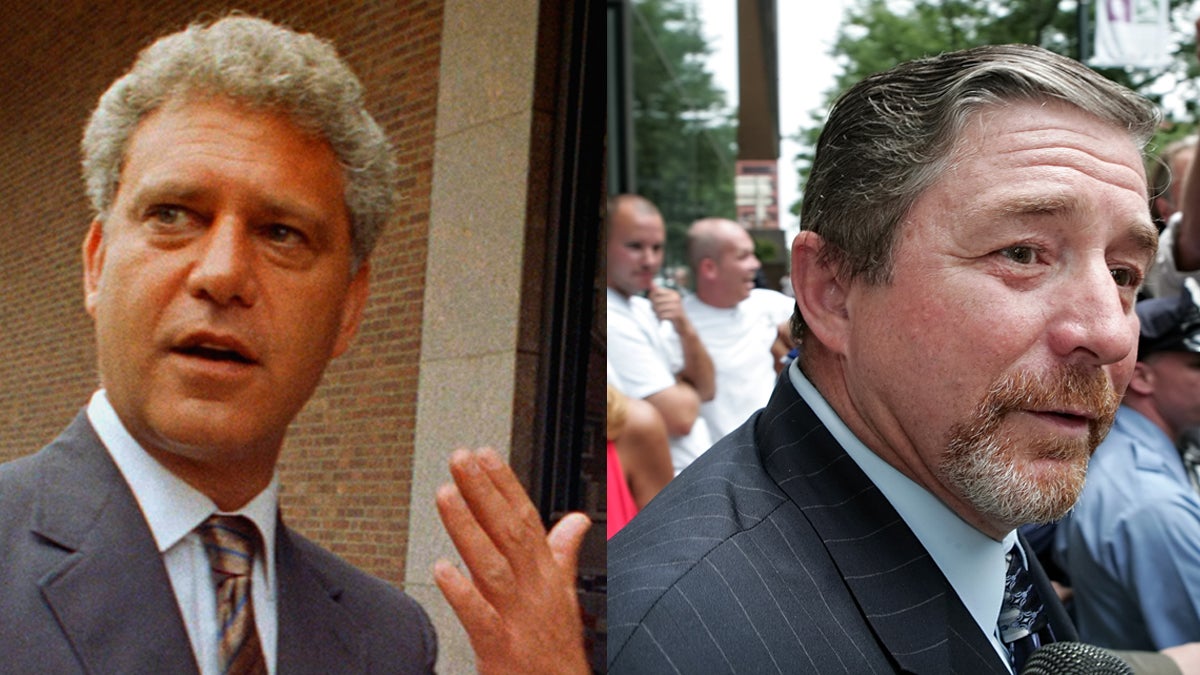Too much power? Council powers lead to hard time

Former Philadelphia City Councilmen Leland Beloff in 1987 (left) and Rick Mariano in 2006. (AP file photos)
When I read the Pew Charitable Trusts report on the Philadelphia City Council’s tradition of giving Council members control over development decisions in their districts, it took me down memory lane.
No doubt plenty of good comes from Council members giving communities a say in what happens in their neighborhoods.
But plenty of mischief has come from it too.
Back in the ’80s, Councilman Leland Beloff used the fact that Penn’s Landing fell in his district to try extorting a million dollars from developer Willard Rouse. Rouse went to the FBI, and Beloff went to prison.
I went to see former Councilman Jimmy Tayoun, who held Beloff’s 1st District seat before Beloff had it and, again, after Beloff went to jail. He now publishes the Philadelphia Public Record.
When I asked him about the tradition of “councilmanic prerogative,” Tayoun got all poetic and said it’s a two-edged sword.
“And any sword that has two edges used by human beings cuts the wrong way, no matter what you do,” Tayoun said, “because [Council members] fall victim to the ego of being able to make decisions that nobody can challenge.”
Tayoun told me he spent a lot of time working with developers who worried community groups would want him to stop their projects. He said he’d tell developers to come to a neighborhood meeting, “and bring your architect with an eraser,” so he could make some changes to accommodate community concerns.
He told me a developer once quietly offered a bribe, flashing both hands three times, to indicate the number 30, meaning he was prepared to pay $30,000. Tayoun said he never wanted or took money.
“‘Just do me one favor,'” Tayoun said he told the developer. “‘If I have to send somebody over to you, and they think you’re hiring, give me the courtesy of coming down and shaking his hand and turning him over to your human resources person. Let them handle him – if they like him, they’ll hire him. If they don’t like him, they won’t. That’s all I ask of you is respect for my name.'”
Nice, but a few years after Tayoun was back in Council, he was pleading guilty to corruption charges, in part related to his powers as a district councilman. Tayoun says now he was squeezed into pleading guilty to crimes he didn’t commit — it’s a long story.
Next caseFast forward to 2005, and another district councilman, Rick Mariano, was convicted of taking payoffs from a business owner he helped get city land.
I called and asked Mariano what he thinks of councilmanic prerogative. Looking back, he said, giving Council members the power to quietly kill or green light projects just invites mischief.
“It’s just a very sketchy and nontransparent thing,” he told me. “If I could do everything over again, I wouldn’t be a councilman. But if I was, I would not want anything like that. It can just come back and bite you in the ass.”
Mariano, by the way, is recovering from a stroke he thinks may be related to taking shots in martial arts training. He’s recovering, he says, but not working these days. I wish him well.
One of the big problems with Philadelphia giving district Council members unquestioned authority over development issues is that it’s too easy for them to exercise that power in the shadows, in private meetings with developers.
The Pew report notes there are places in the public record where reasons for certain decisions can be recorded. They aren’t, at least not consistently.
The Pew report doesn’t conclude that councilmanic prerogative causes corruption. It does say that developers in the city have accepted it as a fact of life.
So I have no doubt we’ll see other names added to the District Council Wall of Shame.
WHYY is your source for fact-based, in-depth journalism and information. As a nonprofit organization, we rely on financial support from readers like you. Please give today.


